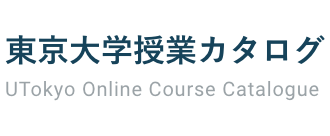過去(2021年度)の授業の情報です
学内のオンライン授業の情報漏洩防止のため,URLやアカウント、教室の記載は削除しております。
最終更新日:2024年4月1日
授業計画や教室は変更となる可能性があるため、必ずUTASで最新の情報を確認して下さい。
UTASにアクセスできない方は、担当教員または部局教務へお問い合わせ下さい。
最終更新日:2024年4月1日
授業計画や教室は変更となる可能性があるため、必ずUTASで最新の情報を確認して下さい。
UTASにアクセスできない方は、担当教員または部局教務へお問い合わせ下さい。
Case Study (Social Design and management)
Social Design and Management
In this seminar, students are expected to examine research in various fields such as resources, environment and energy, health and medicine, space and ocean, security, global economy, food and life, AI and digitalization, and learning and communication in relation to various social issues, and attempt to design solutions (technical and institutional solutions) to social issues in concrete ways. In doing so, students will consciously consider what other fields of knowledge are necessary in addition to the knowledge in their own field of expertise, and students will attempt to compare various solution options. Students will also examine the challenges of implementing such solutions in society.
時間割/共通科目コード
コース名
教員
学期
時限
5140743
Case Study (Social Design and management)
城山 英明
集中
講義使用言語
英語
単位
2
実務経験のある教員による授業科目
NO
他学部履修
可
開講所属
公共政策学教育部
授業計画
In the first part of the class, lecturers will give an overview of design concepts in each field, comparing them with each other, as a prerequisite for each student to do this kind of work. Issues include: whether design is even possible; the nature of the design process, including self-organization and roles of stakeholders; the role of scenarios in design; ethics; and transitions.
In the second part of the class, each student will give a presentation and write a report based on the discussion (which is expected to serve also as the basis for writing a side paper for students in the GSDM program).
Following is the structure of the seminar course.
Part 1. Methods of social design – perspectives from various disciplines
24th April
(1) Public policy and engineering
Prof. Shiroyama (politics and public administration) 13:30-14:00
Prof. Mitsuishi (mechanical engineering) 14:00-14:30
Prof. Nakasuka (space engineering) 14:30- 15:00
Cross-cutting discussion 15:00-15:30
(2) Nano-engineering, civil engineering and public health
Prof. Maruyama (nano-scale engneering) 15:40-16:10
Prof. Kato (civil engineering) 16:10- 16:40
Prof. Kobayashi (public health) 16:40-17:10
Cross-cussing discussion 17:10- 17:40
Rapping up 1st day 17:40-17:55
25th April
(3) Ecosystem, life science and IT system
Prof. Yagi (agriculture and fishing) 9:00- 9:30
Prof. Kanou (life science) 9:30- 10:00
Prof. Sakai (information science and technology) 10:00- 10:30
Cross-cutting discussion 10:30- 11:00
(4) Economics, political science and practitioner’s perspective of public policy
Prof. Ohashi (economics) 11:10- 11:40
Prof. Orsi (international politics) 11:40-12:10
Prof. Suzuki (public policy in practice) 12:10- 12:40
Cross-cutting discussion 12:40- 13:10
Rapping up 2nd day 13:10-13:25
Part 2. Presentation by students and discussion
12th June 9:00- 12:30 13:30- 17:00
Interim presentation
4th July 9:00- 12:30 13:30- 17:00
Final Presentation
授業の方法
Lectures, presentations by students followed by discussions
成績評価方法
Attendance and final report
教科書
None
参考書
None
履修上の注意
None





 大学院
大学院

 マイリストに追加
マイリストに追加
 マイリストから削除
マイリストから削除



